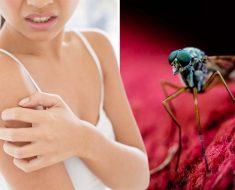The seasonal flu shot is a yearly vaccine administered to protect against the flu, or influenza.
In the United States, flu shots are recommended for everyone ages 6 months and older, according to the Centers for Disease Control and Prevention.
The flu can be a very serious illness, especially in young children, adults ages 65 and over, those with underlying health conditions, and pregnant women.
The flu shot is the best way to protect yourself and family from the flu, the CDC says.
Strains of the flu virus are constantly changing, so a new flu vaccine is made each year. Scientists make the vaccine before the flu season starts by predicting which flu strains are likely to be the most common during the upcoming season.
"Since the flu virus frequently drifts in its genetic composition, you have to reformulate the vaccine, and this is one of the reasons that people have to [get a flu shot] on an annual basis," said Dr. William Schaffner, a preventive medicine and infectious disease expert at Vanderbilt University School of Medicine.
What kinds of flu shots are there?
Flu shots protect against three or four strains of flu virus. Trivalent flu vaccines protect against two influenza A strains — H1N1 and H3N2 — and one influenza B strain. Quadrivalent flu vaccines — offered for the first time in the 2013-2014 flu season — protect against the same strains as the trivalent vaccine, as well as an extra influenza B strain.
In addition to the standard-dose flu vaccine given through a needle, flu shots are available in several different forms, including a high-dose version for those ages 65 and older, a small-needle version (intradermal flu vaccine) for people ages 18 to 64, an egg-free version that's grown in animal cells rather than hen's eggs and is approved for people ages 4 and older, and a nasal spray, which is approved for healthy people ages 2 to 49.
There is also a needle-free flu shot, delivered by a so-called jet injector, which uses a high-pressure stream of fluid to inject the vaccine, the CDC says. It is approved for adults ages 18 to 64.
Flu vaccines for the 2018 to 2019 season
The composition of the 2018-2019 flu shot will be slightly different from last season's flu shot. Specifically, there will be a different strain of the H3N2 virus and a different strain of the influenza B virus in this season's flu shot, compared with last season's shot. According to the CDC, the 2018-2019 trivalent flu shot will contain the following strains of the flu virus:
- A/Michigan/45/2015 (H1N1)pdm09-like virus — This is the H1N1 component that is the same as last year's flu shot.
- A/Singapore/INFIMH-16–0019/2016 A(H3N2)-like virus — This is the H3N2 component that is different from last year's flu shot.
- B/Colorado/06/2017-like (B/Victoria lineage) virus — This is the influenza B strain component that is the different from last year's shot.
The CDC said it was making a change to the influenza B component of the vaccine because of an increase in circulation of influenza B strains that have "drifted" genetically, compared with earlier strains. The agency said it was making a change to the H3N2 component to address concerns that this strain of the virus changes somewhat when it's grown in eggs during the manufacturing process. When the new H3N2 component is grown in eggs, it appears more similar to circulating flu viruses, compared with the strain that was used in last year's vaccine.
The 2018-2019 quadrivalent vaccine will also contain a second influenza B strain called "B/Phuket/3073/2013-like (B/Yamagata lineage) virus," which was also included in last season's quadrivalent vaccine.
Is the nasal spray recommended?
After not recommending the flu nasal spray for the past two years, the CDC is once again recommending the spray during the 2018-2019 flu season.
For both the 2016-2017 season and the 2017-2018 season, the CDC omitted the nasal spray, called FluMist, from its list of recommended flu vaccine types. That's because data showed that the nasal spray was not very effective at preventing flu from 2013 to 2016, the CDC said.
But this year, the maker of FluMist, AstraZeneca, said that it had slightly changed the formulation of the spray, and a study of U.S. children who received the spray suggested that the new formulation produced a better immune response than the old one. It was partly based on this data that the CDC added the nasal spray back to its list of recommended flu shot types. (The nasal spray is licensed for healthy people ages 2 to 49, but it is not recommended for pregnant women.)
Still, some experts disagree with the CDC recommendation. The American Academy of Pediatrics (AAP) said that it will still advise families to choose the flu shot, rather than the nasal spray, during the 2018-2019 flu season.
After reviewing the same data that the CDC used to make its decision, "the AAP recommends children receive the injectable form of the vaccine, which was shown to be more consistently effective against most strains of the flu virus over the past several flu seasons," compared with the nasal spray, the organization said in a statement.
But the AAP said that the nasal spray could be used this year as a "last resort" for children who would otherwise not receive a flu shot.
"If you get the nasal spray vaccine, just be aware that, depending on the performance of the new vaccine formulation, there might be a chance you will not be fully protected," Dr. Flor Munoz, a member of the AAP Committee on Infectious Diseases, said in the statement. "The efficacy of this new [nasal spray] formulation has not yet been determined."
When should you get a flu shot?
Exactly when the flu season starts and ends is unpredictable, so health officials recommend that people get their flu shot in early fall, preferably by the end of October, the CDC says. Flu activity typically peaks in January or February.
"We'd like to get as many people protected against influenza before influenza becomes active in communities across the country," Schaffner said.
Most flu vaccines are given before Thanksgiving, Schaffner said, but people can still get their shot throughout the winter months. Each season's flu shot expires in June of that year, but Schaffner said that he would consider it "too late" to get a flu vaccine after March, unless a person is traveling to the Southern Hemisphere (where the flu season will be starting).
After vaccination, it takes a person about two weeks to build up immunity against the flu.
People can visit the CDC's HealthMap Vaccine Finder to find flu shot locations, although they should call the location ahead of time to see if they have the vaccine in stock.
How effective is the flu vaccine?
The effectiveness of the seasonal flu vaccine depends upon several factors, including how well the flu strains in the vaccine match the strains in circulation. Some studies show that when strains in the vaccine are a good match with the ones that are circulating, vaccinated individuals are 60 percent less likely to catch the flu than people who aren't vaccinated, according to the CDC.
Flu vaccine effectiveness can also vary depending on the person being vaccinated — the vaccine tends to work best in healthy adults and older children, and less well in older adults.
For instance, a 2013 study from the CDC found that the year's flu vaccine was not very effective in adults ages 65 and over: Older people who got the vaccine were just as likely to visit the doctor for flu symptoms as those who did not get the vaccine.
But other studies suggest that individuals who do get sick develop less serve symptoms if they are vaccinated. A 2013 study published in the journal Clinical Infectious Diseases found that people who got the flu shot were less likely to be hospitalized with the flu.
There are some studies that suggest the high-dose flu vaccine provides better protection for older adults. The high-dose flu vaccine contains four times the dose of the standard vaccine, Schaffner said. A 2014 study in the New England Journal of Medicine found that the high-dose vaccine provides 24 percent more protection against the flu than the standard dose, Schaffner said.
Are flu vaccines safe for pregnant women?
Yes. Studies show flu vaccines are safe for women in any stage of pregnancy, the CDC says.
There are several reasons why it's important for pregnant women to get a flu shot, Schaffner said.
"Pregnant women, when they get influenza, have a tendency to get a more severe disease," and are at increased risk for complications and hospitalization from the disease, Schaffner said.
In addition, flu vaccination in pregnancy helps to protect the baby against flu during the first six months of life, when the baby is too young to receive a flu shot, Schaffner said. The mother "passes that protection on to her newborn baby," Schaffner said.
What are the side effects?
According to the CDC, mild side effects from the flu shot include soreness, redness or swelling at the injection site, low-grade fever and aches. Only about 1 percent to 2 percent of people who get a flu shot will have fever as a side effect, Schaffner said.
Rare but serious side effects can occur, including allergic reactions. Symptoms of serious side effects include difficulty breathing, swelling around the eyes or lips, hives, racing heart, dizziness and high fever. If you experience serious side effects, you should seek medical care immediately, the CDC says.
For children, side effects from the flu nasal spray can include runny nose, wheezing, headache, vomiting, muscle aches and fever. For adults, side effects include runny nose, headache, sore throat and cough. These side effects last a short time compared to the actual flu illness, the CDC says.
Can you get the flu from the flu shot?
"It's a myth that you can get flu from the flu vaccine," Schaffner said.
The viruses in the flu shot are killed, so people cannot get the flu from a flu vaccine. However, because it takes about two weeks for people to build up immunity after they get the flu vaccine, some people may catch the flu shortly after their vaccinated, if they are exposed to the flu during this time period.
Some people may also mistakenly attribute symptoms of a cold to the vaccine, Schaffner said.
The nasal spray vaccine contains a "live attenuated" flu virus, but the virus is weakened so that it cannot cause the flu. The viruses in the nasal spray can't replicate in the warm temperatures of the lungs and other parts in the body. However, because temperatures in the nose are colder, the virus causes a small infection in the nose. This infection does not cause symptoms in most people, but in some people, it causes symptoms such as runny nose and sore throat, Schaffner said.
This local infection will prompt the body to make antibodies against the flu virus, Schaffner said. "That provides better protection against the real flu, which is of course, is a virus that can make you seriously ill," Schaffner said.
Who should not get a flu vaccine?
Children younger than 6 months cannot get a flu shot. Those who've had a severe allergic reaction to a flu vaccine in the past should generally not be vaccinated, the CDC says.
You should not get the flu vaccine if you have a high fever. (You should wait until the fever is gone.)
However, if you have minor illness, like a mild cold or a headache, you can still get a flu shot, Schaffner said. "The vaccine does perfectly well in those folks."
This article is for informational purposes only, and is not meant to offer medical advice.
Follow Rachael Rettner @RachaelRettner. Follow Live Science @livescience, Facebook & Google+.
Source: Read Full Article





